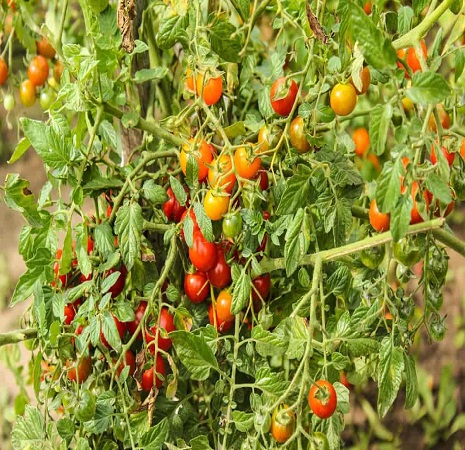In the Indian climate, the ideal timing for providing specific nutrients to tomato plants, from planting to harvesting, can be tailored to suit the local growing conditions. Here is a general guideline for nutrient application throughout the different stages of tomato plant growth in the Indian climate:
Pre-planting: Before planting tomato seedlings, it is recommended to prepare the soil by adding well-decomposed organic matter like compost or farmyard manure. This helps improve soil fertility and nutrient availability for the plants.
Seedling stage: During the initial growth stage, tomato seedlings benefit from a balanced fertilizer application. Applying a slow-release or organic fertilizer at planting time provides a gradual release of nutrients to support early root development and establishment.
Early vegetative stage: As the tomato plants develop their first true leaves, it is important to provide nitrogen for healthy foliage growth. Applying a nitrogen-rich fertilizer can stimulate leaf production and overall plant growth. It is advisable to divide the total nitrogen requirement into multiple applications at regular intervals.
Flowering and fruiting stage: When tomato plants start flowering, they require a balanced supply of nutrients to support fruit development. It is recommended to provide a fertilizer with a higher phosphorus and potassium content. Phosphorus aids in flower formation and fruit set, while potassium enhances fruit quality and disease resistance. Splitting the total phosphorus and potassium requirement into multiple applications during this stage can be beneficial.
Ripening stage: As the tomatoes begin to ripen, it is important to reduce nitrogen application to avoid excessive vegetative growth and redirect the plant's energy towards fruit ripening. However, continue to provide phosphorus and potassium to support fruit maturation and improve flavor.
Micronutrients: Regular monitoring of the plant's nutrient status is crucial. If deficiencies are observed, timely foliar sprays or soil applications of appropriate micronutrients like zinc, iron, manganese, and boron can be beneficial for healthy plant growth and optimum yield.
It is worth noting that the specific timing and nutrient requirements may vary depending on local soil conditions, climate, tomato variety, and cultivation practices. Therefore, it is recommended to consider soil testing and seek advice from local agricultural extension services or horticulture experts who have expertise in tomato cultivation in the specific Indian region.

